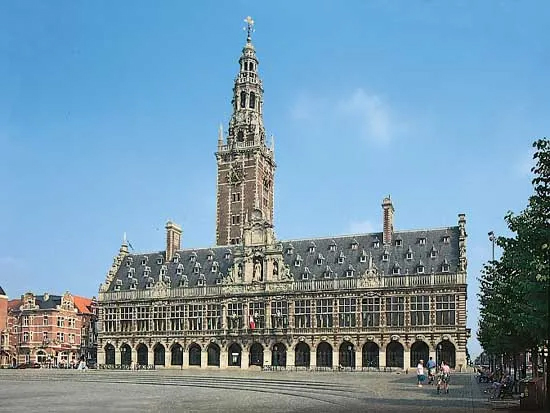Classmates are now episcopal colleagues as they help lead the U.S. Church
By Jim Wogan
Bishop Mark Beckman’s sister, Melissa, remembers the day her oldest brother left for Belgium.
“When he was headed to the airport, I hid because I didn’t want him to get on the plane, and it took them a while to find me,” she said, looking back almost 40 years. “We wrote letters back and forth, and he would call every now and then. He would send us chocolates from Belgium.”
In 1984, following his graduation from St. Ambrose College Seminary in Davenport, Iowa, Mark Beckman made a leap of faith—a giant step that took him 4,500 miles from his hometown of Lawrenceburg, Tenn., all the way to the small Belgian city of Leuven, also referred to as Louvain in French.
“Monsignor Tracy Ellis, the dean of Catholic-American Church history, gave a lecture at St. Ambrose in my senior year and said he believed that Louvain at that point was the center of Catholic thinking in the world because of how it impacted the theology of the Second Vatican Council,” Bishop Beckman said. “That made me want to study there, and a couple of my professors at St. Ambrose had studied there. That was a big draw.”
The Catholic University of Leuven (Katholieke Universiteit Leuven or KU-Leuven) was founded in 1425. It remains a focal point of learning, and as a testament to its place and prominence in Catholic history, Pope Francis will visit the university in September to help celebrate its 600th anniversary.
For the young bishop-to-be, studying in Belgium presented an appealing opportunity. The idea was also attractive to two other young seminarians who now wear a miter: Archbishop Shelton J. Fabre of Louisville and Bishop J. Mark Spalding of Nashville.
“The three of us were students together in Louvain. I believe Archbishop Fabre was a year behind me in studies, and I believe my fourth year was the first year Bishop Spalding was in Louvain,” Bishop Beckman recalled. “The American College where we lived, the residence, only had about 50 seminarians at the time. We all knew each other very well.”
Archbishop Fabre, who served as the principal consecrator at Bishop Beckman’s episcopal ordination, received a bachelor’s degree in religious studies from the Catholic University in 1987 and a master’s degree in religious studies in 1989.
“I went to four years of college seminary with the Benedictine Monks at St. Joseph Seminary College in Louisiana,” Archbishop Fabre said. “My next four years of theological education were in Louvain. I always say, St. Joseph Seminary College in Louisiana in the Benedictine tradition taught me how to pray. When I went to the American College at the Catholic University in Louvain, they taught me how to think theologically. They were both very foundational in my own life.”
Bishop Spalding, the youngest of the three, and a co-consecrator at Bishop Beckman’s episcopal ordination, remembers the rigorous academic standards and the challenge it presented to young seminarians who studied there. He received a master’s degree, a baccalaureate in sacred theology [STB] in religious studies in 1990, and a licentiate in canon law in 1992.

From left, Bishop J. Mark Spalding, Bishop-elect Mark Beckman, and Archbishop Shelton J. Fabre share a moment prior to Mass. (Photo Gabrielle Nolan)
“We had a very good house at that time. The relationships across the board were good and fruitful,” the Nashville bishop said. “The students attending at that time were all gifted academically and gifted in other ways. We were strong in liturgy, formation, and homiletics. So, just sharing all those good experiences bind seminarians together. It was a good moment for me and a good moment for Bishop Beckman to live, and learn, and grow.
“Any strong academic-theological program helps all priests for the rest of their lives, and that was a strong part of the experience in Louvain. The theologians were world-known, well-published, and at the top of their field. It was good to go there at that time to truly take in that knowledge and wisdom that those professors gave us,” Bishop Spalding said.
While Bishop Spalding is the youngest of the three, he remembers Bishop Beckman as a seminarian who set a positive example when it came to attendance and punctuality.
“I am going to compliment him. I don’t think I ever beat him into the chapel. He was always in the chapel before I got there, and he was seated in the same chair every day,” Bishop Spalding recalled. “Whether it was morning prayer, Mass, you name it, he was always sitting in that one chair right up near the altar. I remember coming back the year after he left, and I remember thinking, well, time passes … and we go on.”
Monsignor Mike Johnston, who has served for more than 50 years as a priest and pastor in the Diocese of Nashville, knew Bishop Beckman as a seminarian.
“At that time, we had seminarians that were assigned to go to Louvain for preparation for the priesthood. I think the theology there was very sound, very moderate, and middle of the road. It was relatively small at that time, but there (was) a good community there that he flourished in,” Monsignor Johnston said. “I know it was tough for him at the beginning, for anyone being that far away from home and family. I think the gloominess of that area (weather) was a challenge. But he got used to that and dealt with it.”
If there were adjustments to living and studying in a foreign country, the future bishop of Knoxville had no regrets. His time there helped shape his priesthood.
“Just being exposed so much to the Church universal by traveling throughout Europe. We spent a lot of time in Rome, a lot of time in Italy, and throughout Europe,” Bishop Beckman said. “Secondly, the theology there was extremely rigorous and tied to what we called the historical critical method. You studied a topic and how the understanding of that topic developed in each century of the Church’s history, even going back to the Old Testament. The academic rigor shaped me for sure. And I was a stranger in a country, right? So, I got the experience of what it felt like to be out of your own cultural milieu, and that has always given me a special heart for people who are new to our country because for four years I lived as a stranger in another country.”
Archbishop Fabre shares the same respect for his Belgian education and the impact it has had on his priesthood.
“I believe it taught me to think on my feet and to respond to situations as they present themselves,” he said. “I think it also taught me to think theologically in the moment, and to think theologically long term. I was very appreciative of the different cultures I was exposed to, the culture of Belgium and all the cultures across Europe and the Church, and the face of the Church in each one of those places.”
Because of their distance from home, many of the seminarians studying in Belgium became friends. For Bishop Beckman and Archbishop Fabre, their friendship was trusting (or daring) enough to justify a couple of mega-road trips, even by European standards.
“The archbishop and I and two other seminarians, the four of us, rented a car one Easter break and drove from Belgium to Greece and back,” Bishop Beckman said.
For the record, that’s about 2,700 kilometers (1,670 miles) one-way.
“We were on Easter break, so we decided we would drive to Greece, the four of us. I remember we went to the Easter Vigil Mass at the Roman Catholic cathedral in Athens,” Archbishop Fabre said.
Like most college students of the time, it was a budget trip. They drove a small rental car packed with luggage and enough room to hold four people. Meals were often impromptu.
“I remember being so hungry we stopped at one place in Greece, and the people didn’t know English, and we didn’t speak Greek, or whatever language they were speaking. So, they just kind of brought us the blue-plate special, and I still don’t know to this day what we ate,” Archbishop Fabre remembered. “I really think it was tongue. But I don’t want to think about it. I was just so hungry; I would have eaten anything.”
While in Greece, they visited Sparta, Corinth, Olympia, and Athens. Archbishop Fabre remembers they drove though Yugoslavia, which no longer exists.
The Greek road trip wasn’t the only adventure for the future bishops. They once drove to Berlin, which at the time was still a divided German city—democratic on one side (West Berlin) and communist on the other (East Berlin).
“It was just … ‘I want to go to Berlin’. So, the four of us drove to Berlin,” Archbishop Fabre said. “We (eventually) went into the communist part of the city. I had made a promise to my father before I left that I would not go to any communist country. My father was in World War II, and he didn’t believe in that. Well, I broke that promise, and I went to Berlin, and then I remember we went into East Berlin, the four of us, Bishop Beckman, me, and two other seminarians. At that time, they required you to keep a close tally of what you bought and the money you spent. When we left to go back into West Berlin, they (East German border guards) looked at our records, and I will never forget, they pulled the four of us aside. Now, I thought, I am going to be arrested in a communist country, and my father is going to say, ‘I told you not to go there.’
“They took us into a room, and they yelled and screamed at us, and I remember one of the students spoke some German. And he was saying, they’re upset because our money does not equal out. They were basically saying we got money on the black market. None of us understood.”
Fortunately, the East Germans let the four seminarians leave, avoiding an international incident and a newspaper headline Archbishop Fabre’s dad wouldn’t want to see.
“Community was very important because we were all we had at significant moments like Christmas, Easter, and all those times,” Archbishop Fabre recalled. “Remember, there were no cell phones, there was no Facetime. It was just a telephone in the hallway. When you go on vacation, you would tell the seminary, ‘I am going to Berlin,’ and that was it. They didn’t know how to get in touch with you. Your family knew you were traveling, but they couldn’t get in touch with you. You were as connected to your family as you could be, but that was just a phone in the hallway that would ring at all hours of the night because people forgot the time change.”
The bond that developed between the American seminarians living in Belgium 40 years ago remains strong. In addition to Archbishop Fabre and Bishop Spalding, Bishop Ed Weisenburger of Tucson, Ariz., another Catholic University alumnus, attended Bishop Beckman’s Mass of ordination and installation in Knoxville.
Their lives have come full circle since those days in Belgium. They are now Church leaders and shepherds of their diocesan flocks.
“It amazes me how the Holy Spirit has worked in each one of our lives to bring us together again in this wonderful moment of the Church for the Diocese of Knoxville,” Bishop Spalding said. “It is something quite special and fraternal. It’s a moment of good friendship, but it’s also a moment in which you see how God has worked in all our lives. God works in mysterious ways, and when you sit back and look over the 30-plus years of all our priesthoods, it’s amazing how the Spirit has worked to bring us together at this moment in time.”

